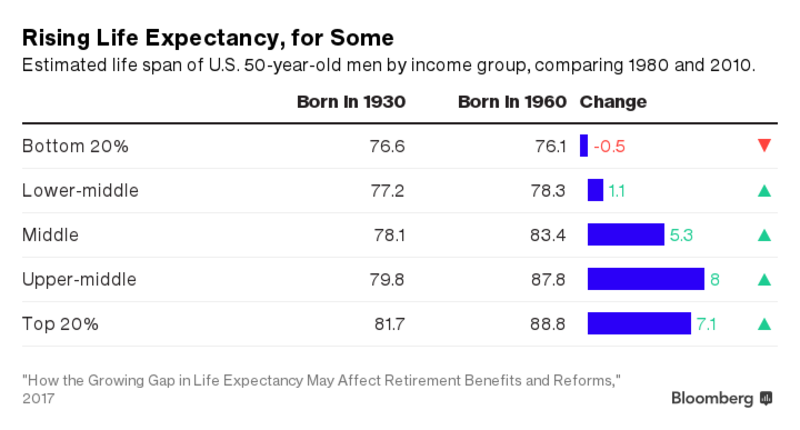We’re living longer and longer. Well, some of us.
Age 100 is now an imaginable goal for young people around the world with good health care. The average woman in Japan is already living to 87. Yet many Americans are dying younger and younger. Based on the latest year of data, the Society of Actuaries last fall dropped its life expectancy estimates for 65-year-olds in the U.S. by six months.
The health of middle-aged non-Hispanic white Americans is deteriorating fastest.
The result of these trends, according to a new study, is a widening gap between wealthier and poorer Americans. The richest people in the U.S. aren’t just getting several years of extra life, they’re also reaping a financial reward for their longevity – courtesy of the U.S. taxpayer. These trends will be crucial as the new administration and Congress consider any changes to Social Security, Medicare, and other programs.

Even tweaks to these programs, from the retirement age to benefit formulas, could affect the rich and poor very differently.
The researchers, a group of 13 prominent economists and health policy experts , tried to figure out how long Americans can expect to live based on their income, focusing on earnings in midcareer, from 41 to 51, and using Social Security data.
The results are stark. In 1980, a 50-year-old man in the wealthiest fifth of the income distribution could expect to live five years longer than a 50-year-old man in the lowest-income group. By 2010, the gap between them had jumped to 12.7 years.
In other words, the poorest fifth of 50-year-old American men can now expect to live just past 76, six months shy of the previous generation. The richest 50-year-olds should make it almost to 89, seven years longer than their parents' generation.
The study focuses on men because the researchers considered the data on women less reliable. Women's move into the workforce over the past 40 years can skew the numbers, for example, because earlier generations of women sometimes had low reported earnings while having a relatively high socioeconomic status. While the researchers weren't prepared to produce specific estimates for women, though, they were confident that women experienced a “similar if not larger change over time” compared with men, citing a previous analysis.
One important result of this 13-year life expectancy gap: Social Security and other government programs, such as Medicare, are becoming a much better deal for well-off Americans.








